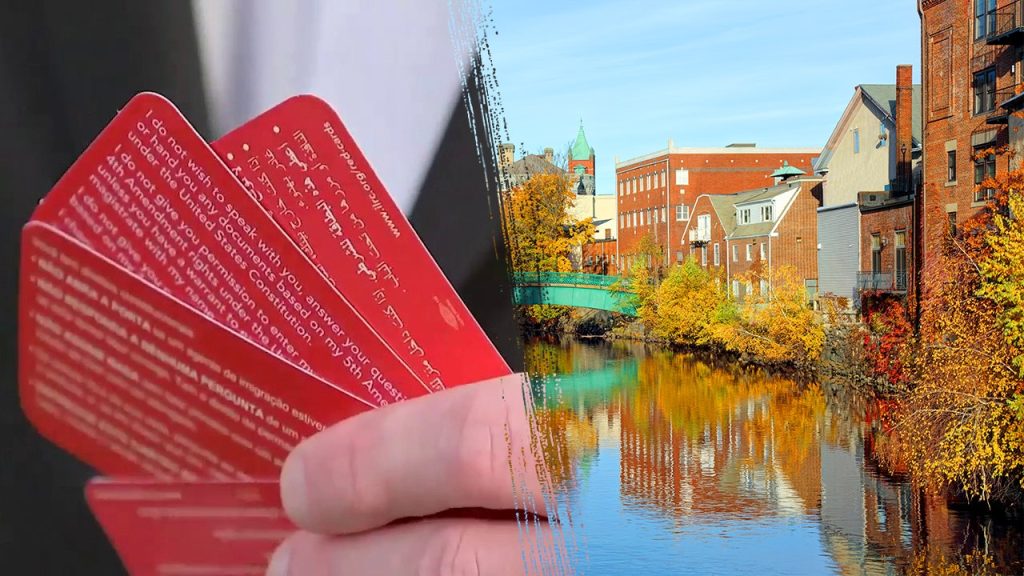In a significant move to support immigrant rights, the Medford City Democratic Committee in Massachusetts has purchased 4,000 red cards designed to inform individuals of their constitutional rights when approached by law enforcement agencies like ICE. These cards, which outline the Fourth and Fifth Amendment rights, are intended for both citizens and noncitizens and are available in multiple languages, emphasizing the city’s commitment to protect its immigrant communities. An additional 4,000 cards have also been approved for future distribution, as part of an effort to counteract federal immigration policies.
| Article Subheadings |
|---|
| 1) Overview of the Red Card Initiative |
| 2) Details of the Card Contents and Translations |
| 3) Funding and Community Support for the Initiative |
| 4) Legal Implications and Community Reactions |
| 5) Future Plans and Broader Context |
Overview of the Red Card Initiative
In Medford, Massachusetts, the local Democratic Committee has taken a bold step by procuring 4,000 red cards intended to inform individuals about their constitutional rights. This initiative emerges amid ongoing national debates regarding immigration policies and the treatment of undocumented immigrants. The cards serve as a tool for empowering residents—both citizens and noncitizens—by outlining essential protections under the Fourth and Fifth Amendments of the U.S. Constitution. These amendments safeguard individuals from unreasonable searches and the right to legal counsel, vital knowledge for anyone who may find themselves in a potentially precarious legal situation involving law enforcement.
Details of the Card Contents and Translations
Each red card succinctly lists crucial civil rights that Americans are entitled to, highlighting protections against unlawful searches and the right to refuse to answer questions without a lawyer present. Medford City Councilor Matthew Leming emphasizes that these cards are meant not only for local immigrants but for all community members. The design of the cards includes English text on one side, with translations available in Spanish, Portuguese, Arabic, and Haitian Creole on the opposite side. This multilingual approach aims to ensure that the information is accessible to a diverse population, reflecting the multicultural fabric of the Medford community.
Funding and Community Support for the Initiative
The initiative’s cost is approximately $826, a figure that has raised questions about funding sources. Councilor Leming has clarified that taxpayer money is not being utilized for this initiative. Instead, the Democratic City Committee has personally financed the project. This decision showcases a commitment to community well-being over political capital, highlighting the city’s focus on providing resources to those most vulnerable to legal challenges. Furthermore, another 4,000 cards have been sanctioned for future purchase, indicating robust community support and the anticipation of increased demand.
Legal Implications and Community Reactions
The legal implications of informing immigrants about their rights have sparked intense discussions among legal experts. The question of whether constitutional protections extend to undocumented immigrants remains a contentious issue, yet many advocates argue that these rights are universal and should be recognized as applicable to everyone residing in the country. Community reaction to this initiative has been predominantly positive, with many praising the efforts to mitigate fears within immigrant populations regarding interactions with federal immigration enforcement. However, critics question the efficacy of such cards in real-world scenarios, suggesting that simply possessing a card may not be sufficient to safeguard against wrongful detention or deportation.
Future Plans and Broader Context
Looking ahead, Councilor Leming expressed excitement about potential expansions of the initiative. He envisions collaboration with local non-profits to facilitate broader distribution of the cards, perhaps even allowing recipients to receive them by mail to ensure that they reach as many people as possible. This effort indicates a proactive approach towards creating a safety net for vulnerable populations amid an increasingly challenging political landscape regarding immigration laws and enforcement. The Medford red card initiative is seen as part of a larger trend in blue states resisting stringent federal immigration policies, echoing the actions of other municipalities that have adopted similar protective measures for their residents.
| No. | Key Points |
|---|---|
| 1 | The Medford City Democratic Committee has issued 4,000 red cards detailing constitutional rights. |
| 2 | Cards provide information on Fourth and Fifth Amendment rights for all individuals. |
| 3 | The initiative is funded entirely by the Democratic City Committee, not taxpayer dollars. |
| 4 | The initiative aims to educate the community about legal rights amidst changing immigration laws. |
| 5 | Future plans include collaborating with non-profits for broader distribution of the red cards. |
Summary
The red card initiative in Medford represents a proactive effort by local officials to ensure that immigrant communities are informed of their constitutional rights amid a backdrop of growing federal immigration enforcement. The distribution of these cards, designed to be accessible and informative, signals a commitment to protecting vulnerable populations in a politically charged atmosphere. As more communities consider similar measures, the Medford model may influence national dialogues on immigration and civil rights.
Frequently Asked Questions
Question: What are the red cards intended for?
The red cards are designed to inform individuals—citizens and noncitizens alike—about their constitutional rights when approached by law enforcement agencies such as ICE.
Question: How is the initiative funded?
The initiative is financed by the Medford City Democratic Committee, with no taxpayer funds involved in the purchase of the cards.
Question: What languages are the cards available in?
The cards are printed in English on one side, with translations available in Spanish, Portuguese, Arabic, and Haitian Creole on the other side to cater to a diverse community.


